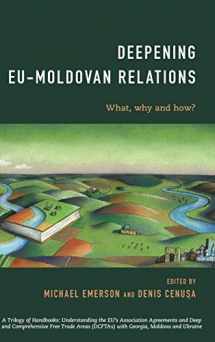
Deepening EU-Moldovan Relations: What, Why and How?
Book details
Summary
Description
Excerpt. © Reprinted by permission. All rights reserved.
Deepening EU-Moldovan Relations What, why and how?
By Michael Emerson, Denis Cenusa, Constantin Sunnenberg Rowman & Littlefield International, Ltd.Copyright © 2016 Centre for European Policy Studies
All rights reserved.
ISBN: 978-1-78660-170-4
Contents
List of Tables and Boxes,
Abbreviations,
Preface,
Summary,
Part I. Political Principles, the Rule of Law and Foreign Policy,
1. Political principles,
2. Rule of law and movement of people,
3. Foreign and security policy,
Part II. Deep and Comprehensive Free Trade Area,
4. Market access for goods,
5. Trade remedies,
6. Customs services,
7. Technical standards for industrial goods,
8. Food safety regulations,
9. Services,
10. Public procurement,
11. Intellectual property rights,
12. Competition policy,
13. Statistics,
Part III. Economic Cooperation,
14. Macroeconomic context and financial assistance,
15. Financial services,
16. Transport,
17. Energy,
18. Environment,
19. Digital sector,
20. Consumer protection,
21. Company law,
22. Agriculture,
23. Employment and social policy,
24. Education, training and culture,
25. Science and technology,
26. EU agencies and programmes,
27. Cross-border cooperation,
28. Civil society,
Part IV. Legal and Institutional Provisions,
29. Dispute settlement,
30. Institutional provisions,
CHAPTER 1
POLITICAL PRINCIPLES
Provisions of the Agreement
The entire Association Agreement is premised on a common commitment to modern European democratic political values, recognising in the preamble that,
the common values on which the European Union is built – namely democracy, respect for human rights and fundamental freedoms, and the rule of law – lie also at the heart of political association and economic integration as envisaged in this Agreement.
These principles are repeated in Art. 2 and are declared "essential elements" of the Agreement. This links up to Art. 455, which states that in the case of violation of these principles the Agreement may be suspended. Political dialogue and cooperation on "domestic reform" should be conducted with respect for these same principles (Art. 6). This political dialogue is conducted through regular meetings at different ministerial and senior official levels.
On the substantive implementation of the basic principles, the jointly agreed Association Agenda text of 26 June 2014 is more explicit. Priority matters for action include institutional questions guaranteeing democracy, the judicial sector, and human rights and fundamental freedoms. These challenges are addressed in considerable detail in the Agenda.
Democratic institutions. The Association Agenda sees the strengthening of the institutions as essential to guaranteeing respect for democracy and the rule of law. There is a specific call for a comprehensive revision of the constitution to clarify the competences of the president and to prevent potential conflict through institutional deadlocks. Furthermore, Moldova has committed itself to clarifying the appointment procedures and competences of the Constitutional Court, and to upgrading the legislation on party financing and advancing decentralisation.
Judicial sector. To ensure the impartiality of the judiciary, prosecution and law enforcement bodies, and their freedom from political interference and corruption, Moldova is expected to ensure the independent functioning of the National Anti-corruption Centre, review the appointment procedures of judges, strengthen the independence of the judiciary, establish zero tolerance of corruption for the legal profession, and reform legislation of the prosecutors, judges and lawyers. In a subsequent statement the EU stresses the urgent need for key reforms: "The reform of the judicial sector and the fight against corruption need real decisive action. It will be moreover crucial for the new government to act resolutely on the serious crisis in the banking sector."
Human rights and fundamental freedoms. In the Associa


We would LOVE it if you could help us and other readers by reviewing the book
Book review



